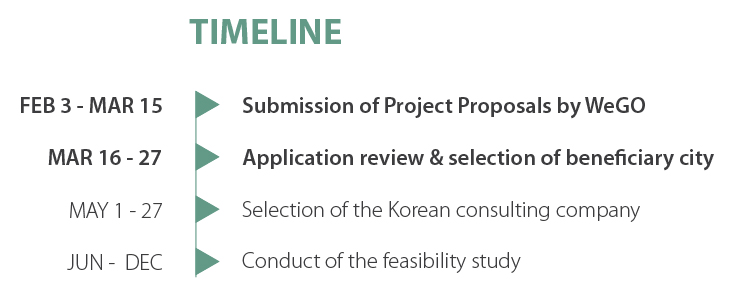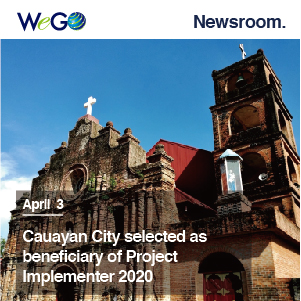ABOUT
WeGO has since its establishment been providing financial support and technical assistance to member cities to facilitate their transformation into smart sustainable cities. Formerly branded as the “Smart Sustainable City Feasibility Study Program, or “F/S,” the WeGO Project Implementer aims to assess its member cities’ current smart city development status, draw practical strategies and implement pilot projects that align with the local and/or national development goals and plans, in cooperation with the selected consultants. For each beneficiary local government whose project proposal is selected, WeGO will sponsor an amount up to KRW 110,000,000 (approx. USD 92,000) toward services from a consultant and solution provider with the needed expertise. The local government, in turn, will be required to contribute both financially and in kind toward further expansion of the project, and the proposals which demonstrate a higher commitment and preparedness to do so will have an advantage in the selection process.

Call for Proposals
Consultancy for the Development of the WeGO Project Implementer program
In the event of its 10th anniversary, WeGO is launching an international call for proposals for consulting companies that can help improve the WeGO Project Implementer program. Through the consultancy, WeGO hopes to better understand the limitations of the program and reflect suggested recommendations to enhance the organization’s capacity in developing scalable projects and supporting cities in becoming smarter and more sustainable.
DEADLINE: Friday August 7, 5pm (KST)
*All documents submitted after the deadline will not be considered.
CONTACT
If you have any questions, please contact Sofia Lee at sofia@we-gov.org.
DETAILS
- Eligibility: Any consulting company that can submit the requested documents by the deadline
- Consultancy period: Two (2) months after contract signing
- Main content
- Program model reviewal and improvement
- Recommendations to expand projects for citywide implementation
- Allocated budget: 29,700,000 KRW
More details in the documents below.

Enabling Better Decision-making through Open-source Infrastructure
Due to the COVID-19 pandemic, the Project Implementer 2020 has been postponed to next year.
This year’s Project Implementer will focus on building infrastructure that enables better decision-making by involving not just government, but citizens and business in an intelligent, connected ecosystem which operates at the intersection of the 3 “D”s: data, digital, and human-centered design. The next generation of urban evolution – Smart City 2.0 – involves moving beyond mere infrastructure upgrades and into the comprehensive use of sensing technology and data analytics, providing improved public services and a higher quality of life by listening to citizens and engaging them as “co-creators” of citizen-centric solutions. To this aim, WeGO seeks scalable projects that focus on building digital infrastructure which recognize citizens as an important source of data generation, solution development, and a testing base for both governments and businesses.

DETAILS
ARCHIVES
Click to download and read the full reports.
- 2024: SAO PAULO – Enhancing Accessibility in São Paulo: Upgrading the Accessible Service Network Map
- 2023: BAGUIO – GIS Map-based AI Heterogeneous Data Convergence City Management System
- 2022: LIMA – WeGO-NIA Feasibility Study for “Lima Smart Tourist Destination”
- 2019: SMART PARKING in Kampala Capital City
- 2019: SMART PARKING in Bharatpur Metropolitan City
- 2018: DA NANG – Data Analytics for Smart Traffic of Da Nang
- 2017: LA MARSA – Smart Waste Management System
- 2016: SEBERANG PERAI – Smart Street Lamp & Traffic Light Monitoring System
- 2015: SAN FERNANDO LA UNION – Civic Participation-Based e-Government System
- 2015: HANOI – Civic Participation-Based e-Government System
- 2013: ADDIS ABABA – Addis Ababa e-Office System
- 2013: DAR ES SALAAM – Feasibility Study for the Implementation of Public Administration Information System Infrastructure in terms of Digitilization of Administrative Tasks (Paperless Office)
- 2013: MAPUTO – Feasibility Study Report on Claims & Solid Waste Management Integrated Information
- 2012: ULANBAATAR – Feasibility Study on Spatial Data Infastructure (SDI) in terms of Underground Facilities such as Network, Pipelines and Electricity in Urban Areas
- 2012: BUENOS AIRES – Smart Citizen Service HUB (AIO) with Smart Card in terms of Citizens’ Service Satisfaction
- 2011: DAR ES SALAAM – Environment Analysis for Groupware and e-Document Management System
- 2010: KATHMANDU – Kathmandu e-Government Feasibility Report


